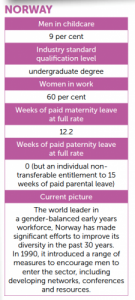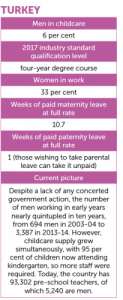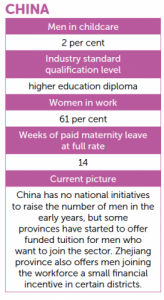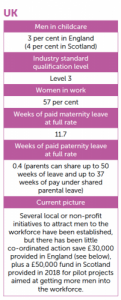Achieving real gender balance in the early years continues to flummox countries across the world. On average in OECD countries, just 3.2 per cent of pre-primary teachers are male, with the rate lower than 1 per cent in most of Eastern Europe, Israel and Portugal.
Despite a 20 per cent minimum target for male workers set by the European Commission in 1996, the proportion of male staff in the workforce remains persistently low across the globe, with only three countries – Norway, Denmark and Turkey – managing over 5 per cent.
Even world-leader Norway seems to be stalling in its progress, hovering just below the 10 per cent mark.
In the UK just 3 per cent of the workforce is male. ‘If I likened it to going up Everest, I’d say we have probably established base camp,’ says David Wright, who chaired a UK task and finish group to address the challenge of recruiting and retaining men in the sector.
Mr Wright, co-owner of Paint Pots Nurseries in Southampton, says the main barriers preventing more men from working in childcare are often:
Pay, status and the idea of men as breadwinners.
Potential to be the targets of allegations of abuse/paedophilia.
Isolation – it can be difficult to be in the tiny minority of colleagues and difficult to get hired if those working in the sector naturally employ people who are similar to them.
The OECD report Good Practice for Good Jobs in Early Childhood Education and Care recommends running information and awareness campaigns targeted at potential male applicants, recruiters, parents and the wider public; establishing networking, mentoring and peer-to-peer support schemes; or even considering affirmative action in the hiring process.
Several countries have attempted these approaches at a local or a governmental level. However, different countries vary significantly in their views of the role of men, whether in their early years settings or in society more widely.

Kari Emilsen, professor in social science at Queen Maud University College of Early Childhood Education in Trondheim, explains, ‘In Norway, we have a strong tradition of equal values in gender policy. We would like to think both genders have equal opportunities.’
She adds that policies such as positive discrimination help. According to the gender equality act, in the early years where men are under-represented, employers can choose a male over a female applicant if he is as well-qualified.
‘We don’t see many employers using it, but it is there and enshrined in law, which sends out a strong signal.’
However, Norway has not yet met its own target, and with no national action plan since 2014, Professor Emilsen says the Government has lost momentum.
‘We used to be the top of the class worldwide, but we are now at around 8.6 per cent. There is a feeling that we are top so we don’t need to do anything else.’
Although a nursery leader can earn a similar income to a police officer or nurse, more men work as unskilled assistants than as early years teachers, and there is a problem with retention.
Professor Emilsen explains, ‘The turnover of young men in the assistant role is quite high. They often go into it because they don’t know what to do after high school, then after two or three years they leave to do something else.’
However, she acknowledges several initiatives are doing good work. ‘They nag municipalities and government and raise young boys’ awareness of the career trajectory available. Often, they go into high schools to talk about it. One project gave teenage boys the opportunity to complete paid work experience in a kindergarten. There is still some earmarked funding for networking groups for men, local strategies, and a national website.’
Betha Thorsen Kanvas Nursery in Oslo, which opened 11 years ago, employs 50 per cent male staff.
Chief executive Øivind Hornslien says, ‘When the Government said it wanted 20 per cent men, I wanted 30 per cent. We managed it in ten years. Back then we sometimes targeted our advertising more towards men, focusing on things like sport or actually saying we wanted male workers. We call all male applicants to interview no matter what.
‘Sometimes we actively try to recruit men because we never want to fall below 40 per cent, but sometimes we have to actively recruit women because we don’t get enough. We are known for it now, so men look for us.’
He adds, ‘Traditionally, men have to prove they can work with children, while people just assume women can look after them. This is bullshit. You just have to be brave. Sometimes you have to take a chance on that 20-year-old boy who maybe doesn’t have a lot of experience but really wants to work with children.’

TURKEY
Despite a lack of any concerted government action, the number of men working in early years nearly quintupled in ten years, from 694 men in 2003-04 to 3,387 in 2013-14. However, childcare supply grew simultaneously, with 95 per cent of children now attending kindergarten, so more staff were required. Today, the country has 93,302 pre-school teachers, of which 5,240 are men.
‘Turkey is a conservative country and gender rules are stricter than in other European countries,’ says associate professor at Van Yüzüncü Yıl University, Ramazan Sak. But both men and women now work and care for children at home, so where people used to see men caring for children as strange, it is starting to seem more normal.
‘Maybe 20 years ago a man did not cook, clean or feed and clothe his children, but now people feel if he can do it at home he can do it at school too. Parents are starting to be quite familiar with it as an idea. Their main concern is whether he is a good teacher, and whether he can play with children as well as a female teacher.’
Over the past 15 years, the divorce rate in Turkey has risen from under 15 per cent of marriages to nearly a quarter. Dr Sak says this creates concerns that sons should have a father figure as they grow up. ‘A lot of our boys are growing up without a male role model, and people want their boys to see men,’ he explains.
cent of marriages to nearly a quarter. Dr Sak says this creates concerns that sons should have a father figure as they grow up. ‘A lot of our boys are growing up without a male role model, and people want their boys to see men,’ he explains.
Dr Sak says the students he teaches see a secure future in early years teaching.
‘Close to half the students in my university classes are men, because they know they will get a job with an early years teaching degree. This year, 20 per cent of students graduating with other teaching majors did not find a job.
‘A pre-school salary is the same as for any other teacher, and the classrooms are not crowded, with just ten to 15 students per class. They work from 7am until 12 or 1pm, so just a five- or six-hour working day.’
It also helps that many more men are nursery administrators, a role with a higher salary and management responsibilities, than practitioners.
However, Dr Sak says he does not see the country reaching an entirely equal gender balance.
‘The number of women, especially from more conservative families, will never decrease in the early years. But I do believe the number of men will increase too. In 50 years, I am sure there will still be more women, but I am hopeful we might at least get to 20 per cent men. Women and men are different and might have different strengths, but we need both in all areas of life. Their talents must be the criteria rather than their gender.’

CHINA
Yuwei Xu, research fellow at the UCL Institute for Education, says the motivation behind attempts to get more men into childcare is a perceived masculinity crisis.
‘There have been a lot of news articles recently about boys crying more and being less masculine, and people think that is because there are too many women in kindergartens,’ he explains. ‘They want men to rescue boys from this so-called “feminisation” and teach them to be men.
‘There has also been a change in the social structure, with fathers involved more in families and mothers going out to work more.
‘However, men are still expected to be breadwinners in Chinese society, so a financial incentive is often regarded as the way to retain men in these roles.’
Men are much more likely to work in state-run settings than private ones, where the financial incentive is higher.
Meanwhile, although women still make up the vast majority of the workforce, men are often guaranteed progression much more quickly, Dr Xu says.
‘There is a glass escalator in that men are often told when they are recruited that they will be promoted to senior management in a couple of years. In one research project, all the male teachers I spoke to reported taking advantage of their gender when they were hired.’
Dr Xu adds Chinese opinions of gender roles are markedly different from Western ideas.

‘There are a lot of social stereotypes about what men’s roles are, and the idea that men offer different things to children. Men are more often put in older classes, caring for children between five and six years old rather than three to five, because older children are seen as needing more education and less care. They are also more often hired as PE teachers rather than working with the same cohort every day.
‘There are also worries about child protection. Women are allowed to take boys or girls to the toilet, but a man cannot take girls to a female toilet.
‘The idea that there is an essential difference between men and women is etched into people’s understanding. We do not actually have a word to distinguish between gender and sex.’
Dr Xu adds that these views are often echoed by the children themselves.
‘We have found Chinese children can be very stereotypical too, with boys feeling they can get what they want from female teachers and girls from male teachers. Children actively construct this idea of gender themselves at times.
‘Of course, they also sense how they are being treated and respond accordingly, and male teachers tend to report treating boys more harshly because they feel they will come across more challenges as adults so need to be stronger, whereas [they say] women need to be softer for family life, and being too strong might cause problems in their relationship.’

United Kingdom
In 2018, following a report from the task and finish group, the DfE provided a £30,000 grant for the Fatherhood Institute to develop a website and charter in 2019, and a social media strategy for the Men in the Early Years (MITEY) campaign.
However, the funding runs out in April, and David Wright, co-owner of Paint Pots Nurseries in Southampton, who co-produced the report, is concerned that Government commitment is waning. ‘I’m told the DfE now feels that box is ticked,’ he says. ‘They want to see a return on their investment, and without concrete numbers of more men, which is simply not achievable with £30,000 in a year, they may not be interested in doing anything further. But I am dogged and determined and we will go back to them.’
Jo Warin, senior lecturer in educational research at Lancaster University, leads a research project called GenderEYE, which received £350,000 of funding from the Economic and Social Research Council. The funding finishes in October, before which the project aims to research how to attract more men into childcare and who the men currently working in the sector are. It will also go towards a conference and training for nursery managers through the Fatherhood Institute to establish ‘gender champions’.
As a result of the project, Dr Warin says she would like to see better, targeted careers advice in schools and job centres, help for settings to understand positive discrimination laws and subsequent generations taking men in early years ‘for granted’ long-term.

She adds, ‘The Early Learning Goals have an overall statement about diversity but nothing gender-specific, while in Sweden they set “challenging gender stereotypes” as a goal. I think we need that curriculum-based aspect too.’
She says a stereotypical approach to what men can do in childcare is unhelpful. ‘A nursery is often seen as a family, with mother and father figures and a more traditional division of labour; that is, caring roles versus rough and tumble. I believe we should be promoting a “gender-flexible” pedagogy in the early years, which is about employing both men and women and providing children with gender-balanced resources and models – whether that involves wearing pink or playing with dolls.’
Some nurseries are already working hard to recruit and retain more men. Little Forest Folk, a group of outdoor nurseries in the South East of England, employs 15 men across six settings.
Operations director Conor Williams says, ‘It’s hard not to make a stereotype out of it, and obviously lots of women love the Forest School approach, but we do find the outdoor aspect draws a lot of men to us initially. Certainly what attracted me at first was that survival element, but I stayed because I really love working with children. We don’t need to offer too many extra frills to attract men because they enjoy this form of education already, but they stay because they love it.’
Inspired by the work done by the London Early Years Foundation (LEYF), Diane Koplewsky and Bronagh Creery of the Sleepy Hollow Group established a men-only training and employment initiative in Northern Ireland last September in collaboration with training provider People 1st. The academy offers Levels 2 to 5 in Children’s Care, Learning and Development, and Playwork.
Ms Koplewsky says the group has employed three men from its academy, bringing its workforce to 9 per cent male. ‘We found most men in the early years are either investors or a joint husband-and-wife team who manage settings rather than working in caring or early education roles with children. We want a workforce which is both diverse and inclusive of all genders.’

